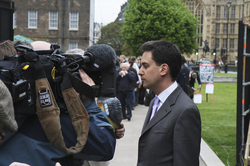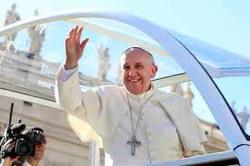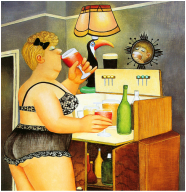The commentators 27-02-15...on UK politicsWith an entry fee of tens of thousands of pounds, Parliament is effectively closed to shop workers, manual workers and those from disadvantaged backgrounds. If you run a corner shop and want to improve your community, you’d balk at the amount of money you’d have to shell out yourself to do it. Today just 4 per cent of our MPs were manual workers before they entered Parliament, compared to 16 per cent in 1979.
- Isabel Hardman, The Independent The unlikeliest graveyard of political ambition is university tuition fees. Labour broke a 2001 manifesto promise not to put them up, Michael Howard was saved from his reckless pledge to abolish them only by losing the 2005 election, and Nick Clegg has never recovered from his university apostasy. Tuition fees is one of those policies that the opposition opposes and the government implements, irrespective of which party is playing which role.
- Philip Collins, The Times If we want immigration to carry on at the rate of around 300,000 a year, we can carry on as now. But if we don’t - if we think that this has an impact on public services, on housing, and on crime - then we need to take action to change it. That means one thing. We either get the EU to abandon its central tenet of free movement of labour. Or we leave. Anything else is hot air.
- Stephen Pollard, Daily Express David Cameron’s pledge to reduce net migration to tens of thousands was rubbish. A pipe dream. A little Englander fantasy. But then, we always knew it was a fantasy. And we knew it was a fantasy for this reason: although David Cameron pledged to reduce immigration, he couldn’t, and he knew he couldn’t. There are many popular theories for why immigration to Britain is increasing. One favourite is the loucheness of our benefits system. Another – recently propagated by the Home Secretary herself – is the corruption of the student visa system. A third is an erosion of those stout sentinels that constitute the UK Border Force.
- Dan Hodges, Daily Telegraph 
Up until five or ten years ago, it would not be unusual for editorial to throw out or move an ad if it sat uncomfortably with the news on a given page. That tended to be in everybody's interests: BA no more wants its ad on a page devoted to an air crash than the journalist placing the story. This may still be the case, although I suspect that these days pressure would be on editorial to reposition the story rather than the other way about.
If so, that is an example of fissures starting to appear in that dividing wall. If a story, however insignificant, has to move from its optimum position in the paper because of advertising considerations, a line has been crossed. A layman's guide to the relationship between editorial and advertising Please sign up for SubScribe updates
|
|

February 26
Minor party leaders February 25 Natalie Bennett February 24 Rifkind and Straw February 23 World affairs 
February 20
UK politics February 19 Chelsea and racism February 18 UK politics February 17 UK politics February 16 Copenhagen shootings 
February 13
UK politics February 12 UK politics February 11 UK politics February 10 UK politics February 9 Politics 
February 6
UK politics February 5 Isis atrocity February 4 UK politics February 3 UK politics February 2 UK politics 

January 23
UK politics January 22 Chilcot inquiry January 21 Page Three January 20 Anti-semitism and Islam January 19 Religion and freedom 
January 16
World politics January 15 Election debates January 14 Charlie Hebdo January 13 Charlie Hebdo January 12 Charlie Hebdo 
January 9
Charlie Hebdo January 8 Charlie Hebdo January 7 UK politics January 6 UK politics January 5 UK politics |
- Home
- General Election 2019
-
Brexit
- Whitetops immigration
- Theresa's travels
- Gove and Trump
- Theresa May's trousers
- Brexit blog
- Events
- Daily Express
- Daily Mail
- Daily Mirror
- Daily Star
- Daily Telegraph
- i
- The Guardian
- The Sun
- The Times
- Daily Star Sunday
- Mail on Sunday
- The Observer
- The People
- Sunday Express
- Sunday Mirror
- Sunday Telegraph
- Sunday Times
- Sun on Sunday
- The schedule
- Blogs
- The industry
-
SubScribe commentary
- Paris terror attacks
- Mohammed Emwazi and Isis killings >
- Charlie Hebdo massacre >
- Kidnapped Nigerian schoolgirls >
- Ebola
- Frontline reporting
- Typhoon Haiyan
- Obama's selfie
- It takes all sorts to make a family >
- Ashya King and the force of authority >
- Poppymania
- Cameron's tax cut promise >
- Brooks Newmark sting
- Scottish referendum >
- The European elections audit >
- Maria Miller
- Harman, Hewitt and the paedophiles >
- Immigration >
- Prince Charles and the floods >
- Food banks
- Why is football more important than all the news? >
- The weather
- Odds and sods
-
OpEd
-
Oped December
>
- Politics 22-12-15
- Brexit: 21-12-15
- Politics 18-12-15
- Politics 17-12-15
- Politics 16-12-15
- EU referendum: 15-12-15
- Politics 14-12-15
- Right-wing politicians 11-12-15
- Donald Trump: 10-12-15
- Donald Trump: 09-12-15
- Politics: 08-12-15
- Politics: 07-12-15
- Syrian airstrikes 04-12-15
- Syrian airstrikes: 03-12-15
- Syrian airstrikes: 02-12-15
- Labour and Syria: 01-12-15
-
OpEd November
>
- Syrian air strikes: 30-11-15
- Autumn Statement: 27-11-15
- Autumn Statement: 26-11-15
- Russia in Syria: 25-11-15
- Comment awards 24-11-15
- Paris attacks: 23-11-15
- Politics: 20-11-15
- Paris attacks 19-11-15
- Terrorism: 18-11-15
- Paris attacks 17-11-15
- Paris attacks 16-11-15
- Politics: 13-11-15
- Politics 12-11-15
- Politics: 11-11-15
- Britain and Europe: 10-11-15
- Remembrance: 09-11-15
- Sinai jet crash: 06-11-15
- UK politics 05-11-15
- UK politics: 04-11-15
- State surveillance: 03-11-15
- Poliitics: 02-11-15
-
OpEd October
>
- Politics: 30-10-15
- Tax credits: 29-10-15
- Tax credits: 28-10-15
- Tax credits: 27-10-15
- Lords v Commons: 26-10-15
- UK politics: 23-10-15
- Politics: 22-10-15
- Xi Jinping: 21-10-15
- Xi Jinping: 20-10-15
- China visit: 19-10-15
- Politics: 16-10-15
- Politics 15-10-15
- Politics: 14-10-15
- EU referendum 13-10-15
- Europe: 12-10-15
- Politics 09-10-15
- Cameron's speech: 08-10-15
- Conservatives: 07-10-15
- Conservatives: 06-10-15
- Conservatives: 05-10-15
- Politics 02-10-15
- Labour conference 01-10-15
-
OpEd September
>
- Politics 01-09-15
- Europe 02-09-15
- Migrant crisis 03-09-15
- Migrant crisis 04-09-15
- Migrant crisis 07-09-15
- Migrant crisis 08-09-15
- OpEd: Drone strikes 09-09-15
- OpEd: Migrant crisis 10-09-15
- OpEd: Jeremy Corbyn 11-09-15
- OpEd: Jeremy Corbyn 14-09-15
- OpEd: Jeremy Corbyn 15-09-15
- OpEd: Jeremy Corbyn 16-09-15
- OpEd: Jeremy Corbyn 17-09-15
- OpEd: Labour 18-09-15
- OpEd: Politics 21-09-15
- OpEd: "Pig-gate" 22-09-15
- OpEd: Politics 23-09-15
- OpEd: VW 24-09-15
- OpEd: Volkswagen 28-09-15
- OpEd: Politics 25-09-15
- OpEd: Politics 29-09-15
- Oped: Labour conference 30-09-15
-
OpEd August
>
- OpEd: Calais 03-08-15
- OpEd: Labour 04-08-15
- OpEd: Labour 05-08-15
- OpEd: Kids Company 06-08-15
- OpEd: Kids Company 07-08-15
- OpEd: Labour 10-08-15
- OpEd: Politics 11-08-15
- OpEd: Politics 12-08-15
- OpEd: Politics 13-08-15
- OpEd: Labour 14-08-15
- OpEd: Labour 17-08-15
- OpEd: Labour 18-08-15
- OpEd: Labour 19-08-15
- OpEd: Student debt 20-08-15
- OpEd: Politics 21-08-15
- OpEd: Politics 24-08-15
- OpEd: Politics 25-08-15
- OpEd: Politics 26-08-15
- OpEd: Jeremy Corbyn 27-08-15
- OpEd: TV shootings 28-08-15
-
OpEd July
>
- OpEd: Grexit 01-07-15
- OpEd: Heathrow 02-07-15
- OpEd: Greece 03-07-15
- OpEd: Taxation 06-07-15
- OpEd: Greece 07-07-15
- OpEd: Budget 08-07-15
- OpEd: Budget 09-07-15
- OpEd: Budget 10-07-15
- OpEd: Greece 13-07-15
- OpEd: Greece 14-07-15
- OpEd: Iran 15-07-15
- OpEd: UK politics 16-07-15
- OpEd: UK politics 17-07-15
- OpEd: Boris Johnson and Greece 20-07-15
- OpEd: counter-terrorism 21-07-15
- OpEd: Labour 22-07-15
- OpEd: Labour 23-07-15
- OpEd: Labour 24-07-15
- OpEd: Labour 27-07-15
- OpEd: Lord Sewel 28-07-15
- OpEd: Labour 29-07-15
- OpEd: Calais 30-07-15
- OpEd: Calais 31-07-15
-
OpEd June
>
- OpEd: Fifa 01-06-15
- OpEd: British politics 02-06-15
- OpEd: Charles Kennedy 03-06-15
- OpEd: Politics 04-06-15
- OpEd: Fifa 05-06-15
- OpEd: Politics 08-06-15
- OpEd: Europe 09-06-15
- OpEd: politics 10-06-15
- OpEd: Politics 11-06-15
- OpEd: Politics 12-06-15
- OpEd: Politics 15-06-15
- OpEd: Social mobility 16-06-15
- OpEd: UK politics 17-06-15
- OpEd: UK politics 18-06-15
- OpEd: Greece 19-06-15
- OpEd: Greece 22-06-15
- OpEd: Greece 23-06-15
- OpEd: UK politics 24-06-15
- OpEd: UK politics 25-06-15
- OpEd: Brexit 26-06-15
- OpEd: Tunisia 29-06-15
- OpEd: Grexit 30-06-15
-
OpEd May
>
- OpEd: Election 01-05-15
- OpEd: Election 05-05-15
- OpEd: Election 06-05-15
- OpEd: Election 07-05-15
- OpEd: Election 08-05-15
- OpEd: Scotland 11-05-15
- OpEd: UK politics 12-05-15
- OpEd: The Labour party 13-05-15
- OpEd: The Labour party 14-05-15
- OpEd: Ukip and Labour 15-05-15
- OpEd: UK politics 18-05-15
- OpEd: The NHS 19-05-15
- OpEd: The Labour party 20-05-15
- OpEd: UK politics 21-05-15
- Oped: UK politics 22-05-15
- OpEd: UK politics 26-05-15
- OpEd: Europe 27-05-15
- OpEd: The Queen's Speech 28-05-15
- OpEd: Fifa 29-05-15
-
OpEd April
>
- OpEd: Election 01-04-15
- OpEd: Election 02-04-15
- OpEd: Election 07-04-15
- OpEd: Election 08-04-15
- OpEd: Election 09-04-15
- OpEd: Election 10-04-15
- OpEd: Election 13-04-15
- OpEd: Election 14-04-15
- OpEd: Election 15-04-15
- OpEd: Election 16-04-15
- OpEd: Election 17-04-15
- OpEd: SNP 20-04-15
- OpEd: Refugees 21-04-15
- OpEd: Election 22-04-15
- OpEd: Election 23-04-15
- OpEd: Election 24-04-15
- OpEd: Election 27-04-15
- OpEd: Election 28-04-15
- OpEd: Election 29-04-15
- OpEd: Election 30-04-15
-
OpEd March
>
- OpEd: Election 31-03-15
- OpEd: Depression 30-03-15
- OpEd: Prince Charles 27-03-15
- OpEd: UK politics 26-03-15
- OpEd: David Cameron 25-03-15
- OpEd: Singapore 24-03-15
- OpEd: UK politics 23-03-15
- OpEd: UK politics 20-03-15
- OpEd: the Budget 19-03-15
- OpEd: UK politics 18-03-15
- OpEd: race in Britain 17-03-15
- OpEd: UK politics 16-03-15
- OpEd: UK politics 13-03-15
- OpEd Jeremy Clarkson 12-03-15
- OpEd: UK politics 11-03-15
- OpEd: UK politics 10-03-15
- OpEd: UK politics 09-03-15
- OpEd: Scotland 06-03-15
- OpEd: Isis 05-03-15
- OpEd: UK politics 04-03-15
- OpEd: Radicalisation 03-03-15
- OpEd: Russia 02-03-15
-
OpEd February
>
- OpEd: UK politics 27-02-15
- OpEd: minority party leaders 26-02-15
- OpEd: the Greens 25-02-15
- OpEd: Rifkind and Straw 24-02-15
- OpEd: world affairs 23-02-15
- OpEd: UK politics 20-02-15
- OpEd: Chelsea and racism 19-02-15
- OpEd: UK politics 18-02-15
- OpEd: UK politics 17-02-15
- OpEd: Copenhagen 16-02-15
- OpEd: UK politics 13-02-15
- OpEd: UK politics 12-02-15
- OpEd: politics 11-02-15
- OpEd: politics 10-02-15
- OpEd: UK politics 09-02-15
- OpEd: UK politics 06-02-15
- OpEd: Isis atrocity 05-02-15
- OpEd: UK politics 04-02-15
- OpEd: UK politics 03-02-15
- OpEd: UK politics 02-02-15
-
OpEd January
>
- OpEd: rape law 30-01-15
- OpEd: UK politics, 29-01-15
- OpEd: Greece 27-01-15
- OpEd: UK politics 28-01-15
- OpEd: UK politics 26-01-15
- OpEd: UK politics 23-01-15
- OpEd: Chilcot inquiry 22-01-15
- OpEd: Page Three 21-01-15
- OpEd: anti-semitism 20-01-15
- OpEd: religion and freedom 19-01-15
- OpEd: world politics 16-01-15
- OpEd: election debates 15-01-15
- OpEd: Charlie Hebdo 14-01-15
- OpEd: Charlie Hebdo 13-01-15
- OpEd: Charlie Hebdo 12-01-15
- OpEd: Charlie Hebdo 08-01-15
- OpEd: Charlie Hebdo 09-01-15
- OpEd: UK politics 07-01-15
- OpEd: UK politics 05-01-15
- OpEd: UK politics 06-01-15
-
Oped December
>
- You have to laugh
-
Backnumbers
- About SubScribe
- Join the SubScribers
- Contact us
- Subscribe to SubScribe












